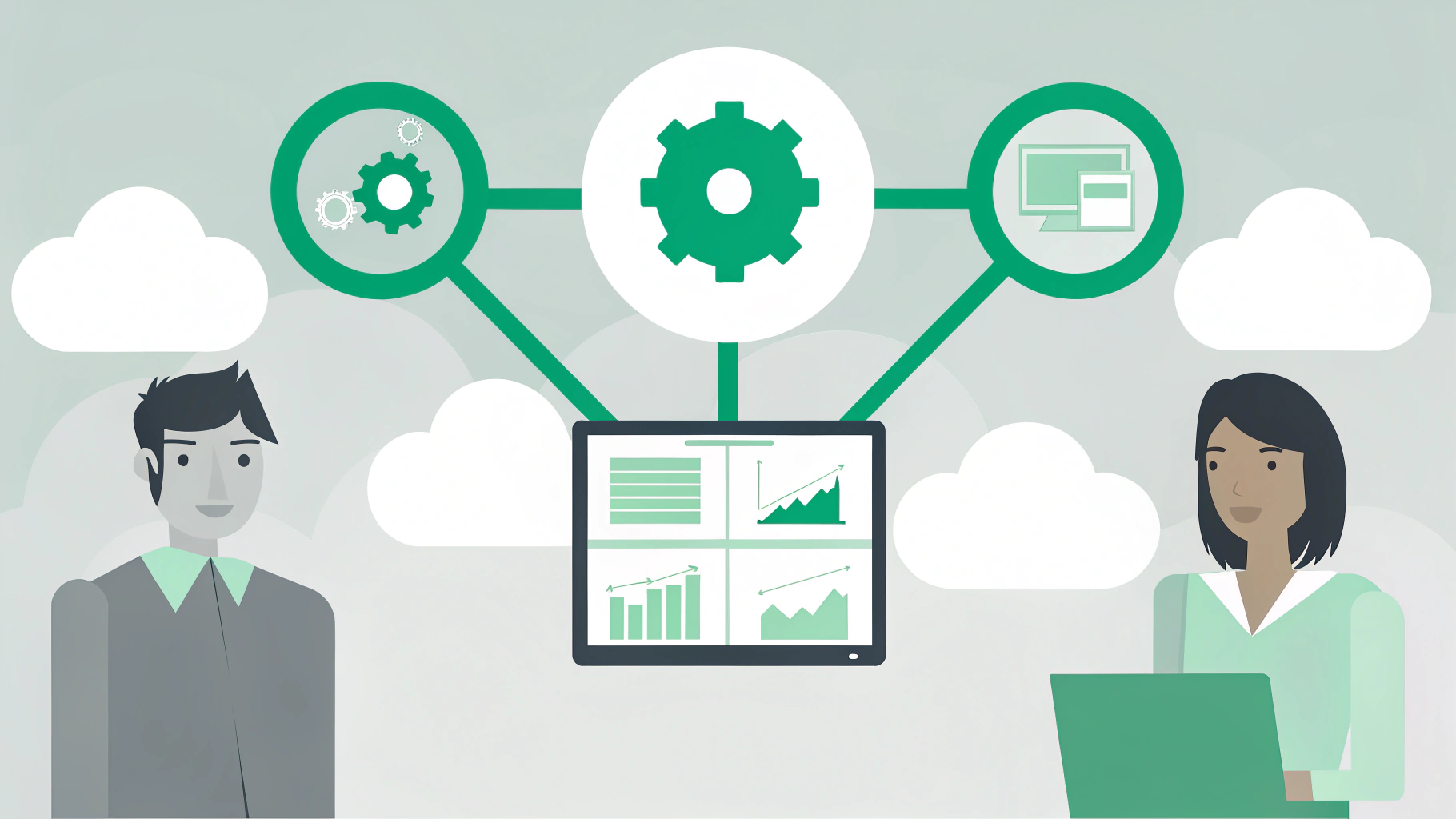Overview
Small business ERP systems, such as 10X ERP, play a crucial role in optimizing operations by seamlessly integrating various business processes. This integration enhances efficiency, accuracy, and decision-making capabilities. Key features, including:
- Real-time data processing
- User-friendly interfaces
- Robust accounting functionalities
collectively empower small businesses to streamline operations. As a result, these systems not only facilitate significant cost savings but also foster growth. For operations managers seeking effective solutions, adopting such systems is not just beneficial; it is essential for achieving competitive advantage.
Introduction
In an increasingly competitive landscape, small businesses face the pressing challenge of optimizing their operations while navigating limited resources. Enterprise Resource Planning (ERP) systems have emerged as a vital solution, providing a unified platform that integrates various business processes to significantly enhance efficiency and decision-making.
This article explores the essential features of small business ERP systems, the substantial benefits they offer, and the critical steps necessary for successful implementation.
With a multitude of options available, how can small businesses ensure they select the right ERP solution that not only addresses their current needs but also scales effectively for future growth?
Define ERP and Its Importance for Small Businesses
Enterprise Resource Planning (ERP) represents a pivotal integrated management software solution, consolidating diverse business processes into a cohesive framework, making small business ERP indispensable for small businesses. By centralizing information from key departments such as accounting, inventory, and sales, ERP systems streamline operations, enhance accuracy, and improve decision-making. This integration is particularly vital for growing distributors, who must adeptly navigate complex supply chains while fostering robust customer relationships.
10X ERP distinguishes itself as a comprehensive cloud-based solution tailored specifically for distributors. Its all-inclusive nature ensures that all essential components are integrated, eliminating the need to seek additional modules. The platform’s real-time data processing capabilities empower stakeholders to make informed decisions based on current information, while its user-friendly interface simplifies the experience for users, facilitating swift onboarding. Furthermore, the transparent pricing model allows companies to clearly understand the value they receive, both presently and as they grow.
The implementation of small business ERP systems yields considerable operational efficiencies. Businesses can automate financial processes such as accounting and invoicing, which not only minimizes manual errors but also guarantees real-time financial reporting. This capability enables small business ERP solutions to manage cash flow adeptly and make informed choices based on up-to-date data rather than outdated reports. Such agility provides a competitive edge in today’s fast-paced market.
Real-world examples underscore the transformative impact of small business ERP on small businesses. For instance, Mounsey Mills transitioned from manual methods to fully integrated solutions, resulting in improved stock management and streamlined invoicing processes. This shift has not only saved time but also enhanced operational visibility, facilitating better resource management. Similarly, Cultech Limited experienced a significant reduction in downtime and maintenance following the implementation of an ERP solution, allowing their IT resources to focus on innovation rather than reactive problem-solving. As Richard Swift, Finance Systems Manager at Enable, remarked, “ERP software can streamline and automate processes, improve efficiency, provide insightful analytics, and reduce operational costs.”
In conclusion, 10X ERP, as a small business ERP, empowers small enterprises to optimize their operations through advanced inventory management solutions, seamless integrations, and comprehensive support, fostering collaboration and enhancing customer experiences, thereby positioning them for sustained growth and success.
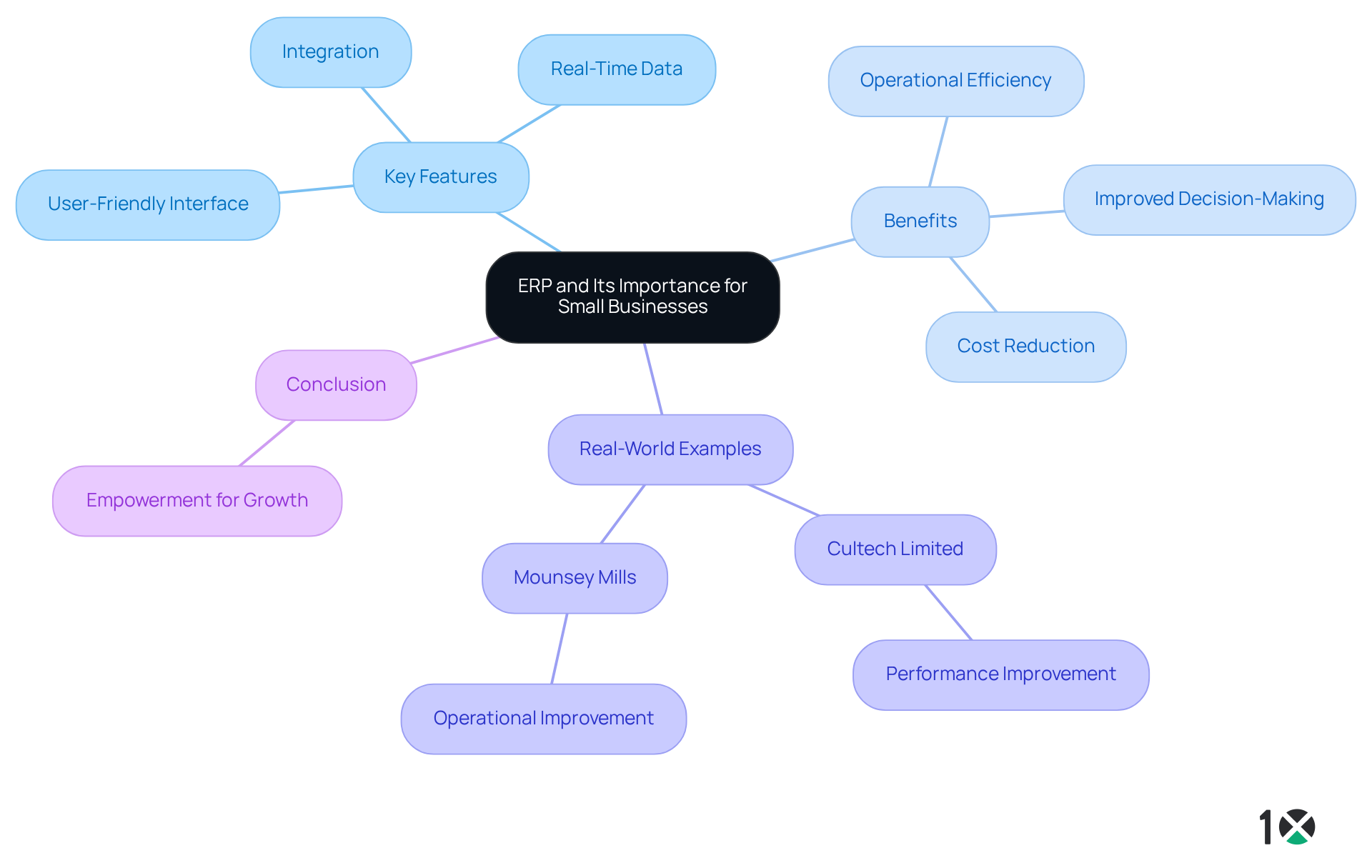
Identify Essential Features of Small Business ERP Systems
When selecting a small business ERP system, small businesses must prioritize essential features that can significantly impact their operations.
-
User-Friendly Interface: A contemporary, intuitive interface is crucial for enabling employees to navigate the platform with ease. This not only reduces training time but also enhances adoption rates. Studies indicate that 62.7% of organizations prefer cloud-based ERP solutions for their user-friendly design. 10X ERP exemplifies this with its responsive design, ensuring accessibility across any device.
-
Real-Time Data Processing: Access to up-to-date information is vital for timely decision-making and operational adjustments. Approximately 95% of enterprises report process enhancements after adopting ERP systems that provide real-time information capabilities, underscoring the importance of this feature. 10X ERP’s real-time information processing empowers stakeholders to make informed decisions swiftly, further emphasizing the necessity of this capability. Moreover, 40% of companies seek more efficient transactions when choosing ERP, highlighting the critical need for real-time data processing.
-
Robust Accounting Capabilities: Comprehensive accounting features, such as invoicing, expense tracking, and financial reporting, are essential for maintaining financial health. Notably, 89% of purchasers consider accounting a crucial aspect of their small business ERP selection, making it a vital factor for small enterprises. 10X ERP’s robust accounting functionalities ensure streamlined and effective financial management.
-
Inventory Management: Effective inventory management tools, including lot tracking and customizable attributes, are critical for maintaining optimal stock levels and minimizing waste. Reports show that 91% of organizations achieve optimized inventory levels post-ERP implementation, demonstrating the value of this feature. 10X ERP provides robust cross-referencing and lot/serial item tracking, ensuring organizations have precise visibility of their inventory at all times.
-
Seamless Integrations: The ability to integrate with other software applications enhances operational capabilities and ensures a smooth workflow across different platforms. A significant 33% of enterprises recognize the necessity for custom APIs to efficiently convert and retrieve information from their ERP systems, highlighting the importance of seamless integrations in enhancing ERP efficiency. 10X ERP’s cloud-based architecture facilitates easy integration with various applications, boosting overall efficiency.
-
Scalability: As organizations grow, their ERP system must be capable of scaling accordingly, accommodating increased data and user demands without compromising performance. This flexibility is essential for small businesses using ERP systems to aim for long-term success in a competitive market. Furthermore, it is crucial to understand the challenges faced during ERP implementation; 54% of companies identify poor project management as a significant barrier, underscoring the need for meticulous planning and execution.
-
Flexible User Permissions: Customizing user roles and permissions is vital for maintaining security and ensuring employees have access to necessary information. 10X ERP provides adaptable user permissions, enabling organizations to tailor access according to specific roles.
-
Built-In Reporting: Comprehensive reporting capabilities are essential for analyzing performance and making informed decisions. 10X ERP includes built-in reporting features that offer stakeholders valuable insights into their operations, further enhancing decision-making processes.
-
Complete Audit Trail: Maintaining a complete audit trail is crucial for compliance and accountability. 10X ERP ensures that all transactions are recorded, providing organizations with a clear perspective of their operations.
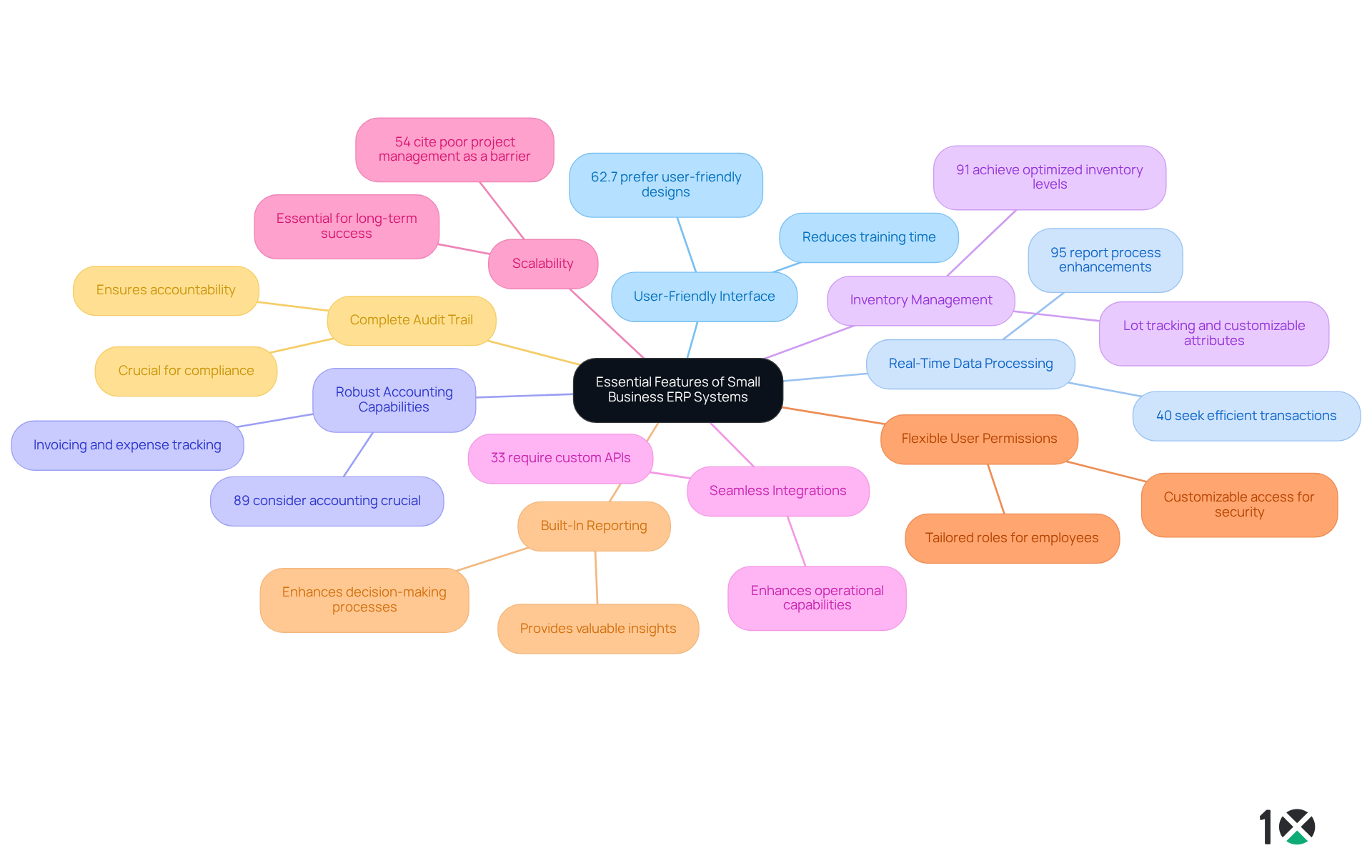
Explore the Benefits of ERP for Small Business Operations
Implementing an ERP system presents a multitude of advantages for small businesses, including:
-
Enhanced Productivity: Automating routine tasks and centralizing information through small business ERP systems like 10X ERP significantly reduces manual work and streamlines processes. With the fastest onboarding time for new users, employees can swiftly adapt, allowing them to concentrate on higher-value activities. Consequently, a remarkable 66% of organizations report improved operational efficiency following implementation.
-
Enhanced Information Precision: 10X ERP, designed for small business ERP, provides a single source of truth, minimizing errors associated with data entry and reporting. This consolidation leads to 90.9% of organizations realizing expected benefits regarding inventory levels after ERP implementation, underscoring the reliability of insights derived from accurate information.
-
Enhanced Collaboration: 10X ERP fosters improved communication and collaboration across departments, ensuring alignment towards common objectives. This interconnectedness effectively eliminates information silos, with 77% of organizations successfully dismantling these barriers and enhancing inter-departmental collaboration post-implementation.
-
Cost Savings: Over time, the efficiencies gained from utilizing small business ERP can result in substantial cost reductions, particularly in inventory management and operational overhead. With a transparent pricing structure, companies can anticipate savings on operational expenses, making it a financially prudent investment.
-
Improved Customer Service: With instant access to customer information and order statuses via small business ERP, companies can respond more rapidly to customer inquiries, enhancing overall satisfaction. Approximately 70% of companies report an improved customer experience through ERP integration, highlighting the system’s critical role in fostering customer loyalty.
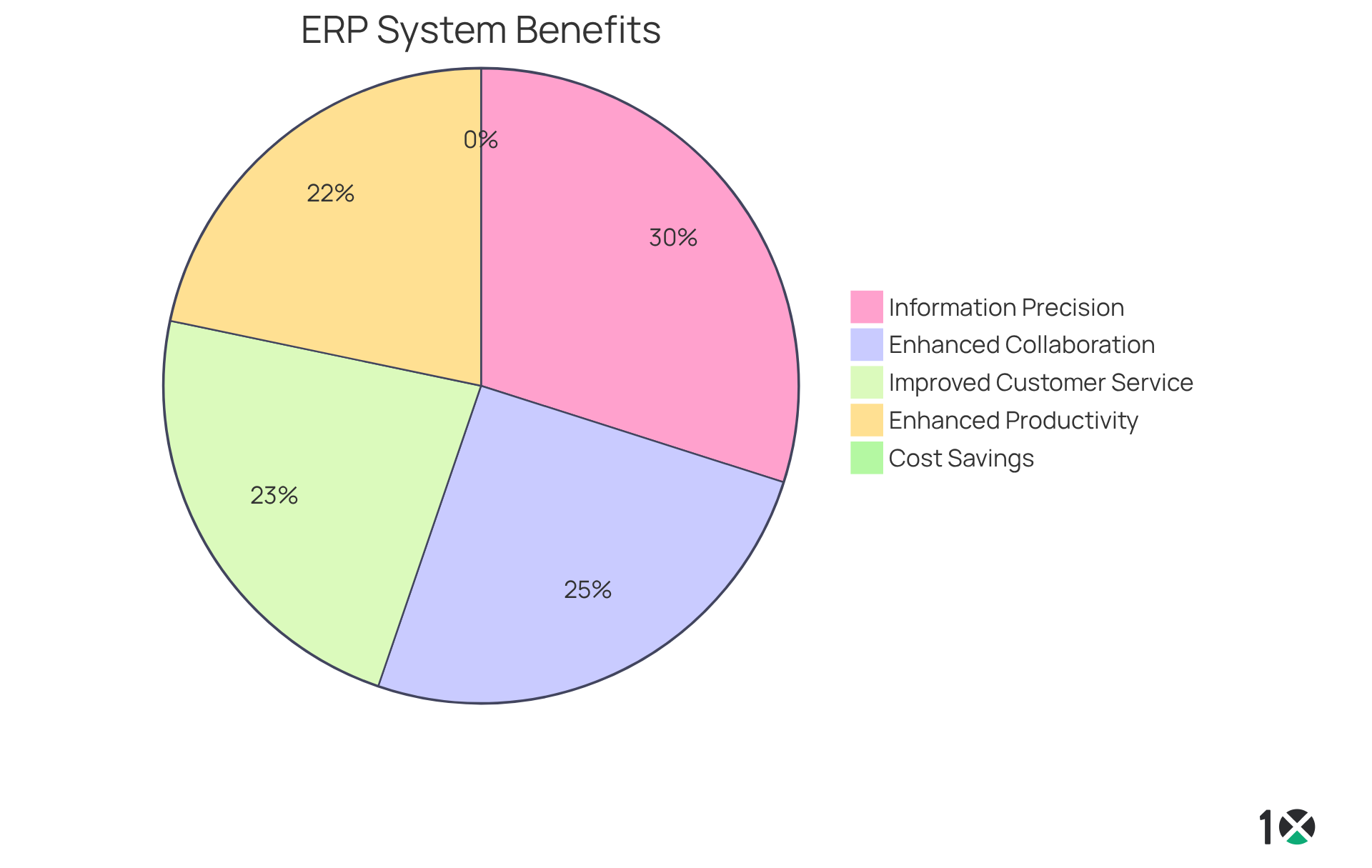
Understand the ERP Implementation Process for Small Businesses
The ERP implementation process for small businesses encompasses several critical steps that are vital for achieving success:
-
Needs Assessment: Start by pinpointing specific business needs and objectives. This foundational step ensures that the selected ERP solution aligns with operational goals, which is crucial for maximizing ROI.
-
Vendor Selection: Engage in thorough research and assess various ERP vendors based on features, pricing, and customer support. This step is paramount, as 55% of ERP implementations fail to meet project objectives due to inadequate vendor alignment.
-
Data Transfer: Systematically organize and execute the transfer of existing information into the new ERP platform. Safeguarding data integrity and accuracy during this phase is essential, as 22% of organizations identify data migration and validation as their most significant challenges.
-
Customization and Configuration: Adapt the ERP framework to suit the unique requirements of your business. This process includes establishing user roles and permissions, which can enhance user satisfaction and operational efficiency.
-
Training and Onboarding: Provide comprehensive training for employees to ensure they are comfortable using the new system. With 10X ERP, in-app video guides created by the developers themselves are available to assist in training new users or refreshing existing ones. This feature significantly improves the user experience by enabling employees to find answers quickly without leaving the app. Effective training is crucial for successful adoption, as employee resistance remains a leading barrier to ERP implementation.
-
Go-Live and Support: Initiate the ERP system and closely monitor its performance. Offering ongoing support to address any issues that arise during the transition is essential for sustaining operational efficiency. 10X ERP provides unparalleled assistance throughout the entire ERP journey, ensuring that companies are not merely clients but partners. This includes a transparent pricing structure that aids small enterprises in understanding the value they are receiving. It is also noteworthy that 31% of companies report that their ERP project took longer than anticipated, underscoring the necessity for meticulous planning and communication throughout the implementation process.
By adhering to these steps and leveraging the comprehensive features and support of 10X ERP, small businesses can more effectively navigate the complexities of small business ERP implementation, ultimately leading to enhanced operational efficiency and improved decision-making capabilities.
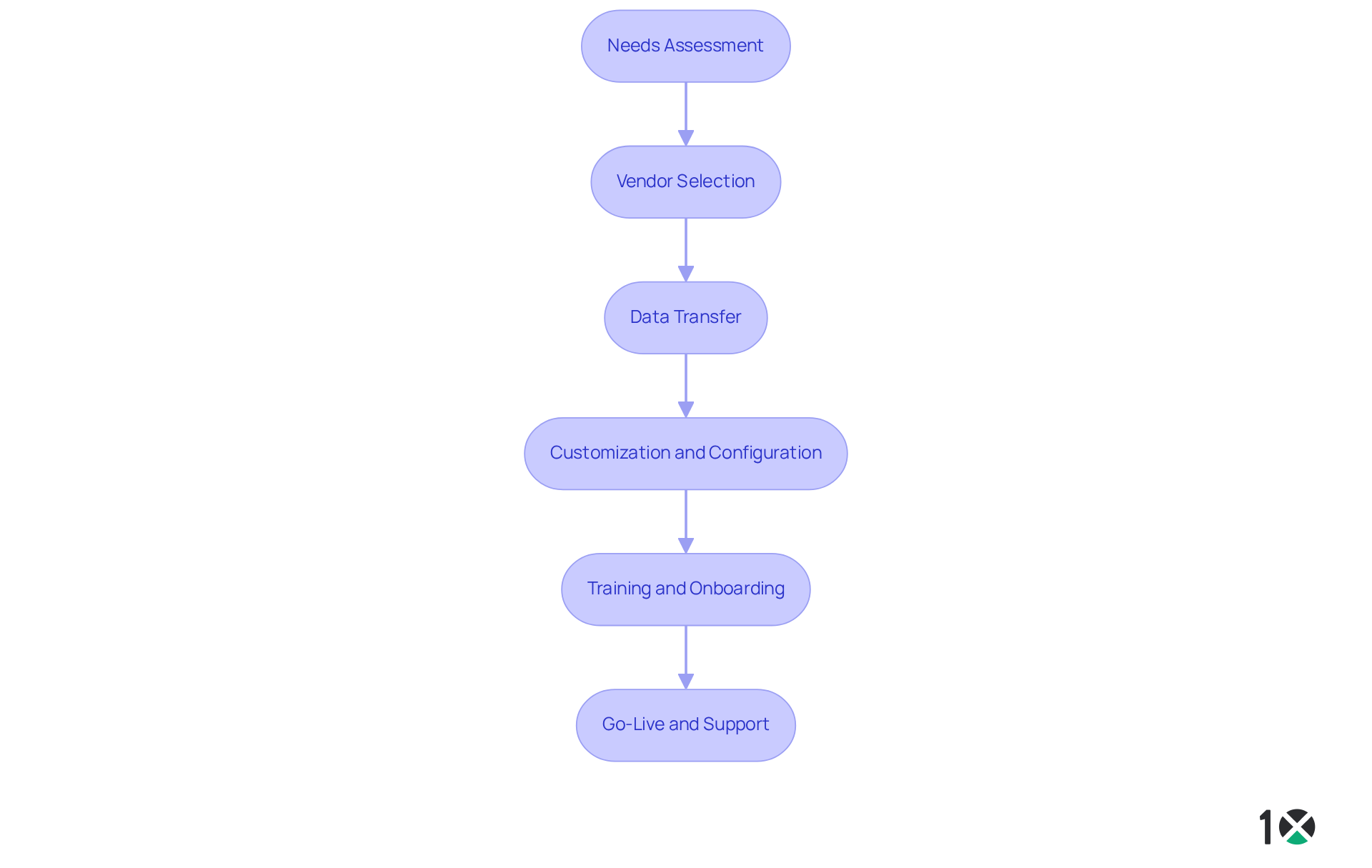
Conclusion
Mastering the implementation and utilization of ERP systems is crucial for small businesses aiming to enhance operational efficiency and decision-making capabilities. By integrating various business processes into a cohesive platform, small business ERP solutions like 10X ERP not only streamline operations but also foster growth and adaptability in an ever-evolving market landscape.
Key features such as:
- user-friendly interfaces
- real-time data processing
- robust accounting capabilities
- seamless integrations
significantly contribute to the effectiveness of ERP systems. The benefits of implementing these systems are numerous, ranging from improved productivity and accuracy to enhanced customer service and cost savings. Real-world examples illustrate how businesses have transformed their operations, showcasing the tangible impact of adopting an ERP solution.
In light of these insights, small businesses are encouraged to embrace ERP systems as a strategic investment. By understanding the essential features and following a structured implementation process, organizations can overcome challenges and unlock the full potential of their operations. The journey towards mastering small business ERP is not just about technology; it is about empowering teams, enhancing collaboration, and ultimately driving success in a competitive environment.
Frequently Asked Questions
What is ERP and why is it important for small businesses?
Enterprise Resource Planning (ERP) is an integrated management software solution that consolidates various business processes into a cohesive framework. It is important for small businesses as it centralizes information from key departments like accounting, inventory, and sales, streamlining operations, enhancing accuracy, and improving decision-making.
How does 10X ERP cater specifically to distributors?
10X ERP is a comprehensive cloud-based solution designed specifically for distributors. It integrates all essential components, eliminating the need for additional modules, and offers real-time data processing capabilities, which helps stakeholders make informed decisions based on current information.
What are the benefits of implementing small business ERP systems?
Implementing small business ERP systems leads to significant operational efficiencies, such as automating financial processes like accounting and invoicing, which reduces manual errors and ensures real-time financial reporting. This allows businesses to manage cash flow effectively and make informed decisions based on up-to-date data.
Can you provide examples of small businesses that benefited from ERP implementation?
Yes, for instance, Mounsey Mills transitioned from manual methods to fully integrated solutions, improving stock management and invoicing processes, which saved time and enhanced operational visibility. Similarly, Cultech Limited saw a significant reduction in downtime and maintenance after implementing an ERP solution, allowing their IT resources to focus on innovation.
What are the key features of 10X ERP that support small businesses?
Key features of 10X ERP include advanced inventory management solutions, seamless integrations, real-time data processing, a user-friendly interface for easy onboarding, and a transparent pricing model that helps businesses understand the value they receive as they grow.
